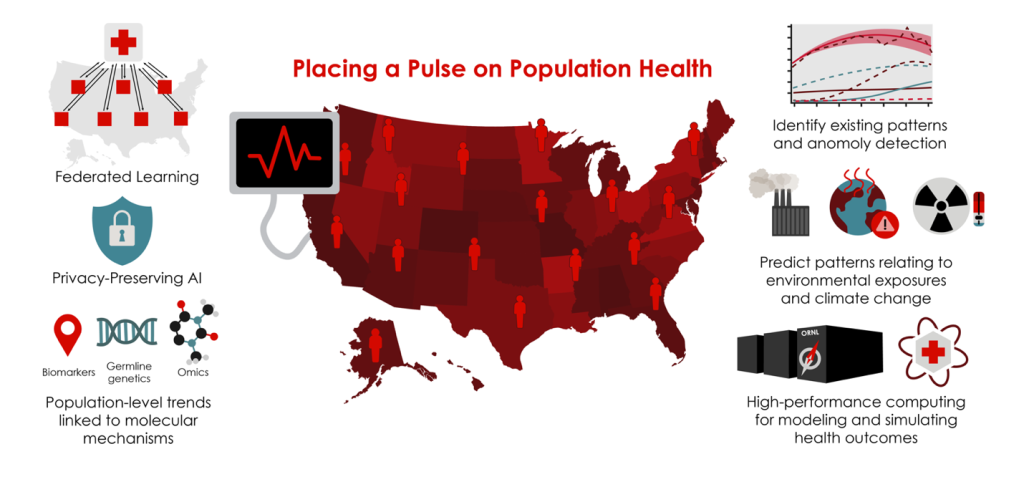
Large amounts of longitudinal, multimodal electronic health data are being produced from a variety of sources daily. If leveraged properly, these comprehensive data sources can be used for innovative precision medicine and precision public health. Coupled with HPC, our group aims to develop translational solutions for: (1) navigating data complexity in multimodal analyses, (2) overcoming issues related to health data privacy and security, (3) scaling real-time information extraction from health records, (4) integrating information from the molecular to the societal level for systems level analyses of health, and (5) forecasting reliable short-and long-range health trends at the individual and population level.
- National Cancer Institute Modeling Outcomes using Surveillance Data and Scalable Artificial Intelligence for Cancer (MOSSAIC) and National Childhood Cancer Registry:
Project type: Computing for population health surveillance
Translational component: The finished products can be used to create real-time cancer surveillance. This is a large improvement on the current 2-year lag period between time of report and curated data that can be used to monitor cancer trends.
Current technological focus: Natural Language Processing (NLP) and large language models (LLM) for automatic extraction of cancer phenotypes, deep learning for image analysis, and deep learning for exposomic analyses. This project is also investigating methods for federated learning with privacy guarantees.
https://datascience.cancer.gov/collaborations/nci-department-energy-collaborations/mossaic - Cincinnati Children’s Hospital Mental Health Trajectories:
Project type: Computing for personalized medicine
Translational component: The goal of the project is to develop a tool that can be used in the clinic to guide the diagnosis and treatment strategies of patients with severe anxiety. It could also be used for public health surveillance with the right modifications, but this is not the intent of the project.
Current technological focus: Machine learning (ML) for development of patient trajectories using structured and unstructured data.
https://www.cincinnatichildrens.org/research/divisions/d/decoding-mental-health/programs/mental-health-trajectories - Social and Environmental Determinants of Health Veteran’s Association:
Project type: Computing for personalized medicine
Translational component: The goal of this project is to improve the VA’s tools for early identification of individuals at risk for adverse mental health events. The tools under development will be deployed in the clinic.
Current technological focus: Developing a resource for acquiring, curating, and storing environmental health datasets that can be used to improve current tools for identifying folks at high risk for an adverse mental health event. - Low Dose Radiation Biology:
Project type: Computing for personalized medicine and population health
Translational component: The clinical tools under development will improve treatment at the individual level by enabling targeted radiologic treatment plans. The population tools under development will provide better estimates of radiation exposure at the population level and increase understanding of the potential health effects of radiation exposure.
Current technological focus: Develop computational capabilities for multiscale radiation dosimetry that is applicable to multiple radiation exposure scenarios, including radiopharmaceuticals, external beam therapy, theranostics, medical imaging, and environmental exposures. - Integrated Design/Build/Learn for Enzyme Engineering LDRD: To accelerate innovation and address new DOE missions, the Enzyme Engineering Initiative aims to develop a highly integrated Design/Build/Test/Learn (DBTL) pipeline for engineering enzymes that act at materials interfaces.
Project type: Computing for personalized medicine
Translational component: The tools focus on generative sequence design and structure characterization of enzymes. They serve as a validation method for population health modeling at the molecular level based on aberrant mutations and molecular mechanisms of disease.
Current technological focus: Enhancing knowledge of the fundamental rules of enzyme engineering as well as integrating and strengthening biological, materials, and computing capabilities at ORNL for rapid enzyme design.
https://ldrd.ornl.gov/drd/enzyme-engineering



